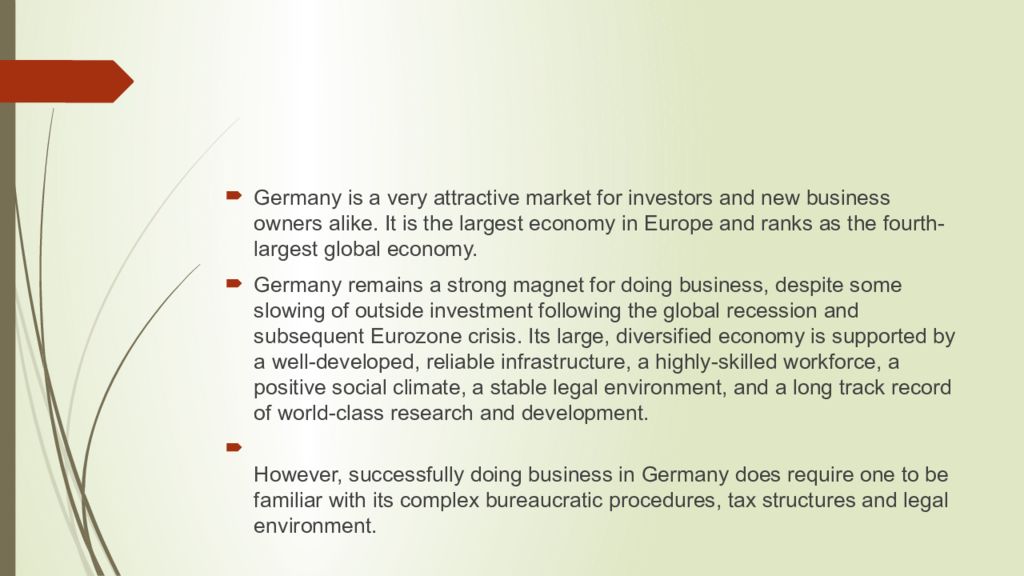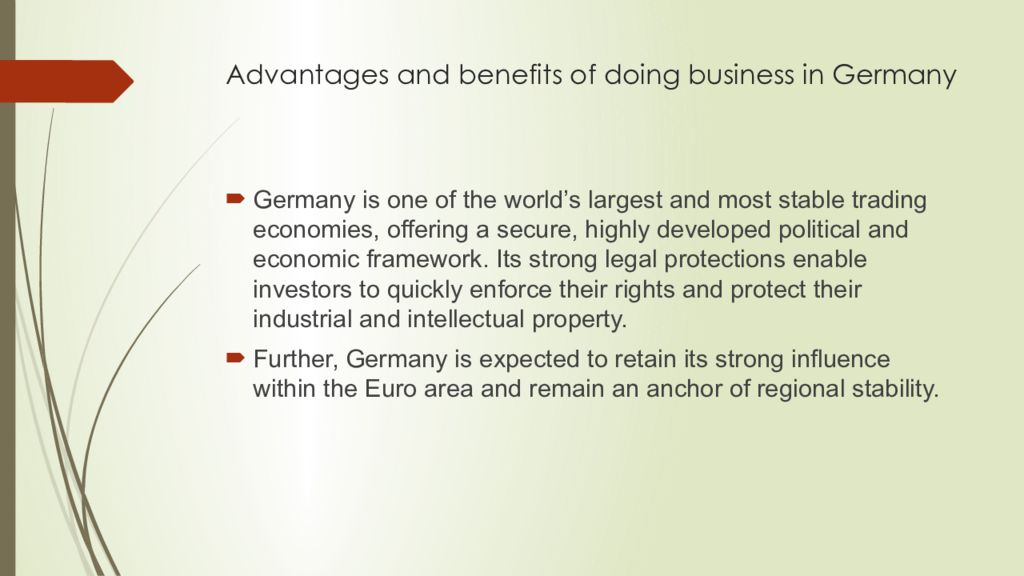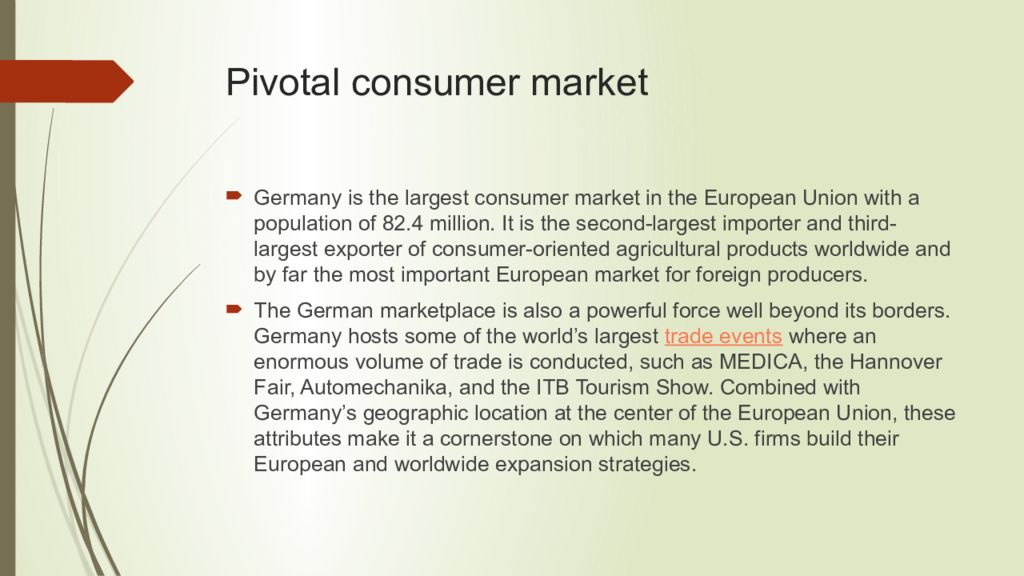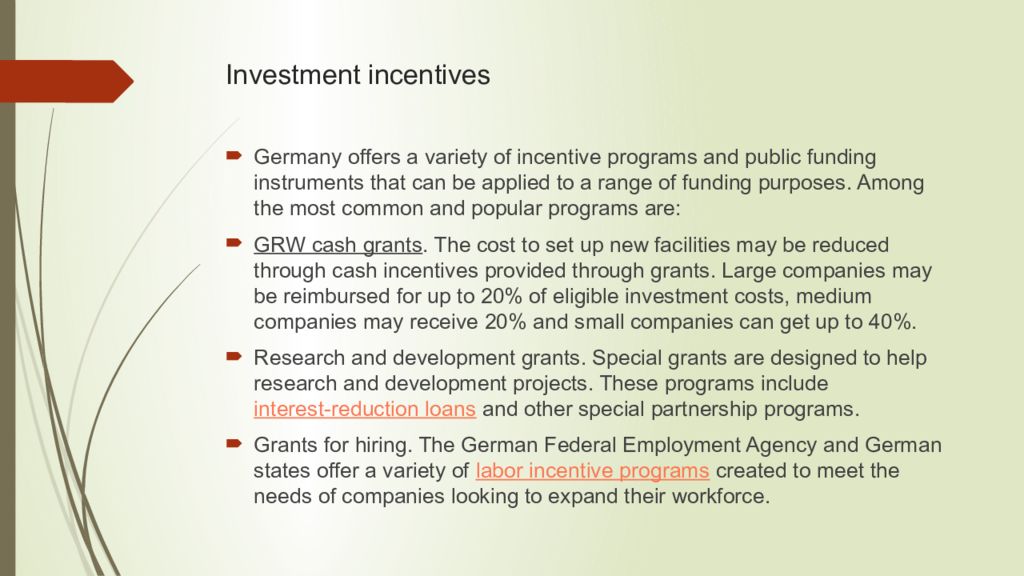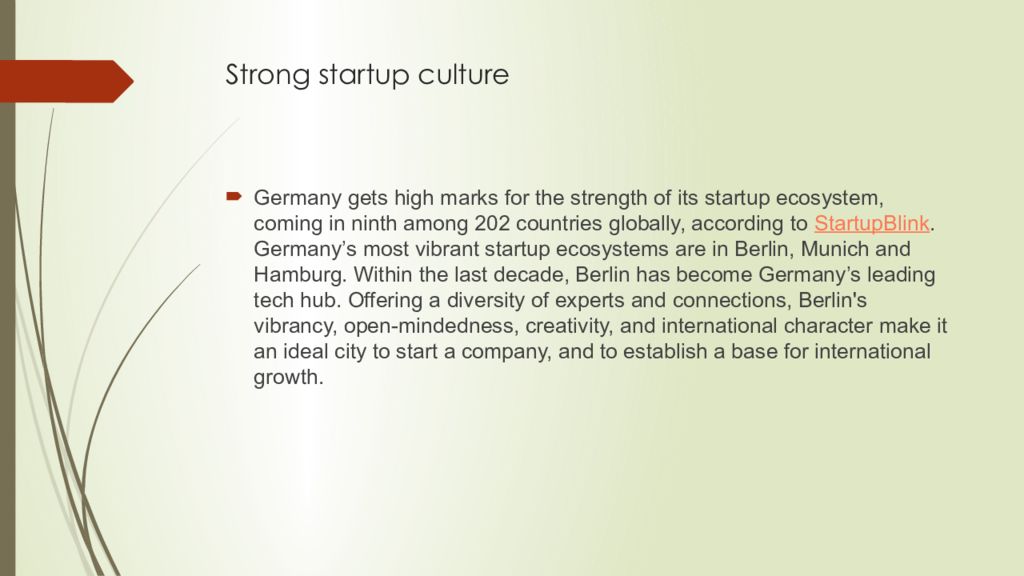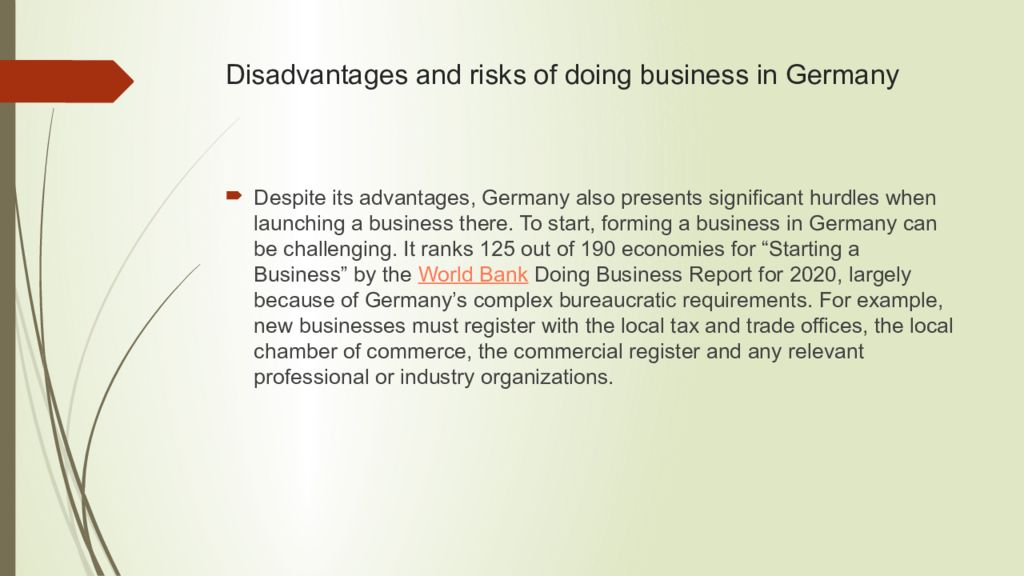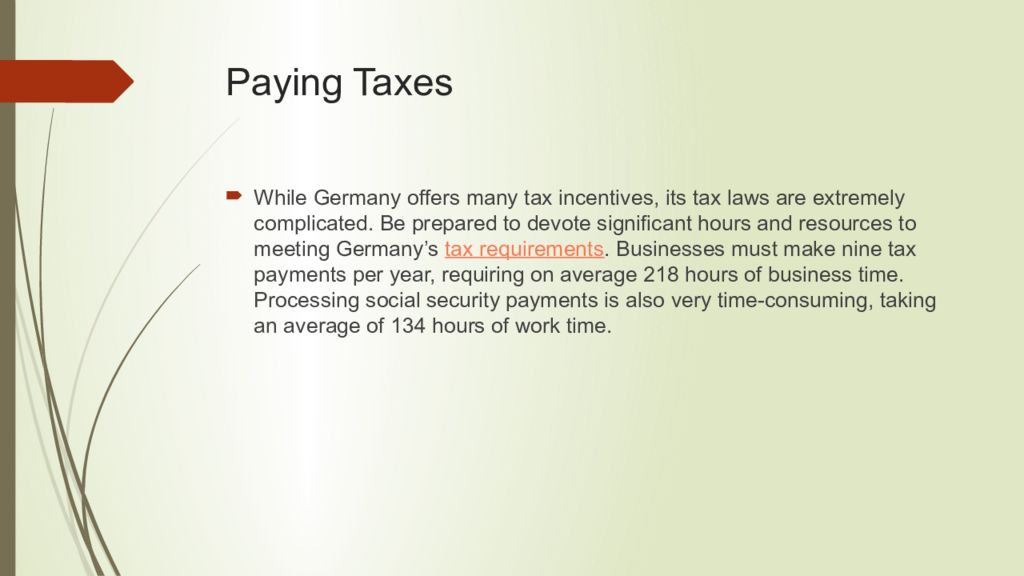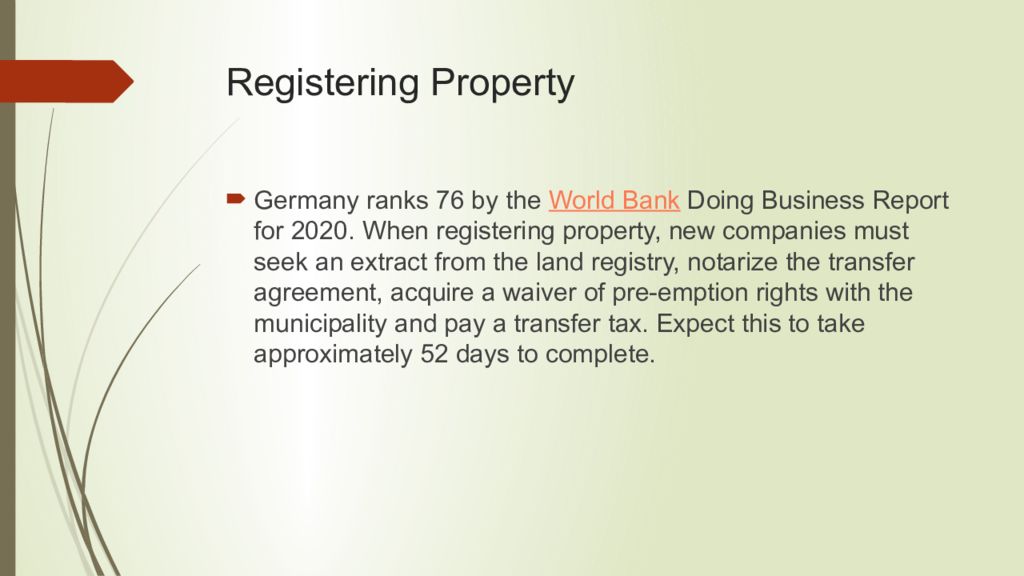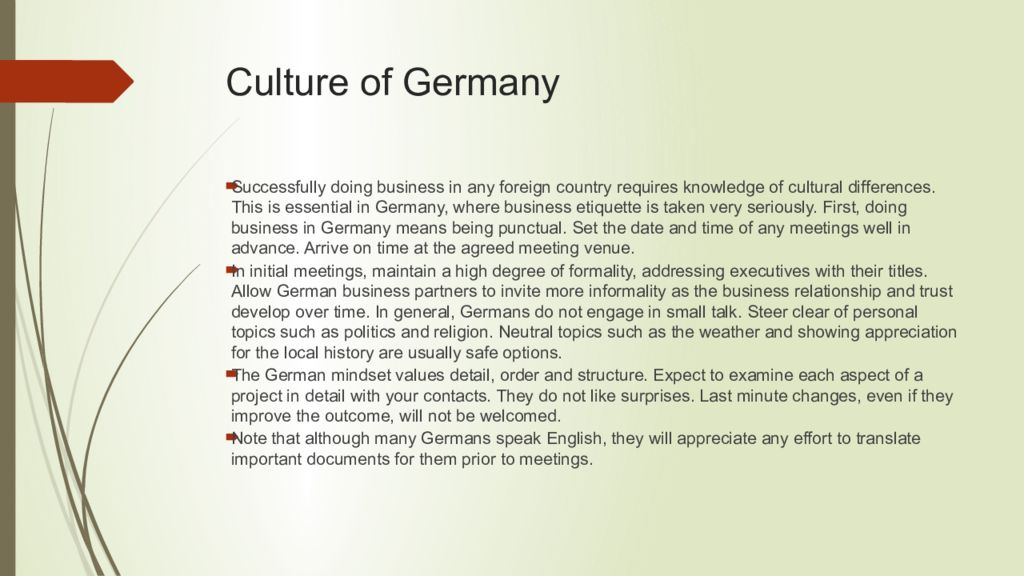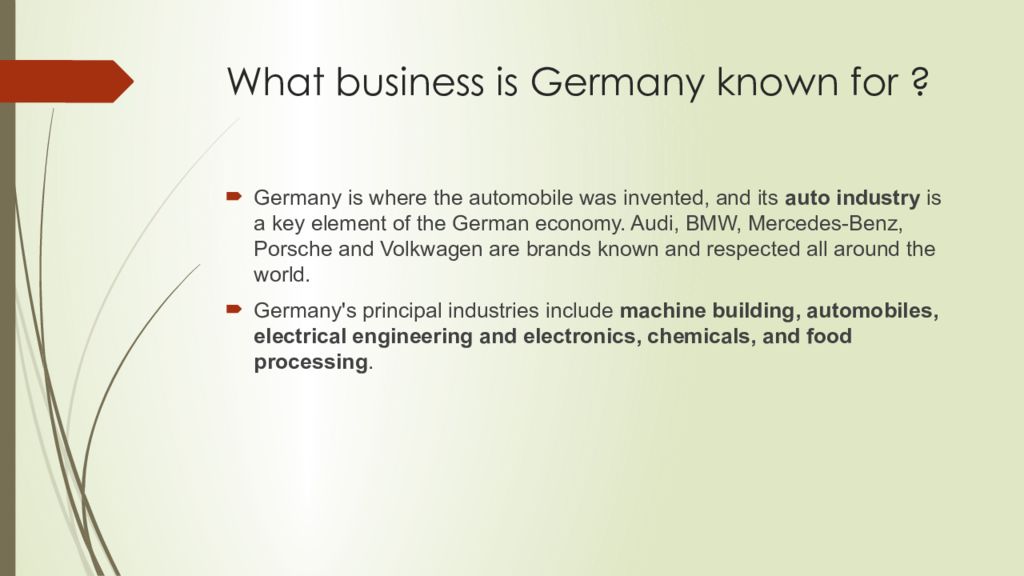Первый слайд презентации: Business Environmetal of Germany
Presented by Asylbekov Aliaskar
Слайд 2
Germany is a very attractive market for investors and new business owners alike. It is the largest economy in Europe and ranks as the fourth-largest global economy. Germany remains a strong magnet for doing business, despite some slowing of outside investment following the global recession and subsequent Eurozone crisis. Its large, diversified economy is supported by a well-developed, reliable infrastructure, a highly-skilled workforce, a positive social climate, a stable legal environment, and a long track record of world-class research and development. However, successfully doing business in Germany does require one to be familiar with its complex bureaucratic procedures, tax structures and legal environment.
Germany is one of the world’s largest and most stable trading economies, offering a secure, highly developed political and economic framework. Its strong legal protections enable investors to quickly enforce their rights and protect their industrial and intellectual property. Further, Germany is expected to retain its strong influence within the Euro area and remain an anchor of regional stability.
Слайд 4: Pivotal consumer market
Germany is the largest consumer market in the European Union with a population of 82.4 million. It is the second-largest importer and third-largest exporter of consumer-oriented agricultural products worldwide and by far the most important European market for foreign producers. The German marketplace is also a powerful force well beyond its borders. Germany hosts some of the world’s largest trade events where an enormous volume of trade is conducted, such as MEDICA, the Hannover Fair, Automechanika, and the ITB Tourism Show. Combined with Germany’s geographic location at the center of the European Union, these attributes make it a cornerstone on which many U.S. firms build their European and worldwide expansion strategies.
Слайд 5: Investment incentives
Germany offers a variety of incentive programs and public funding instruments that can be applied to a range of funding purposes. Among the most common and popular programs are: GRW cash grants. The cost to set up new facilities may be reduced through cash incentives provided through grants. Large companies may be reimbursed for up to 20% of eligible investment costs, medium companies may receive 20% and small companies can get up to 40%. Research and development grants. Special grants are designed to help research and development projects. These programs include interest-reduction loans and other special partnership programs. Grants for hiring. The German Federal Employment Agency and German states offer a variety of labor incentive programs created to meet the needs of companies looking to expand their workforce.
Слайд 6: Strong startup culture
Germany gets high marks for the strength of its startup ecosystem, coming in ninth among 202 countries globally, according to StartupBlink. Germany’s most vibrant startup ecosystems are in Berlin, Munich and Hamburg. Within the last decade, Berlin has become Germany’s leading tech hub. Offering a diversity of experts and connections, Berlin's vibrancy, open-mindedness, creativity, and international character make it an ideal city to start a company, and to establish a base for international growth.
Слайд 7: Disadvantages and risks of doing business in Germany
Despite its advantages, Germany also presents significant hurdles when launching a business there. To start, forming a business in Germany can be challenging. It ranks 125 out of 190 economies for “Starting a Business” by the World Bank Doing Business Report for 2020, largely because of Germany’s complex bureaucratic requirements. For example, new businesses must register with the local tax and trade offices, the local chamber of commerce, the commercial register and any relevant professional or industry organizations.
Слайд 8: Paying Taxes
While Germany offers many tax incentives, its tax laws are extremely complicated. Be prepared to devote significant hours and resources to meeting Germany’s tax requirements. Businesses must make nine tax payments per year, requiring on average 218 hours of business time. Processing social security payments is also very time-consuming, taking an average of 134 hours of work time.
Слайд 9: Registering Property
Germany ranks 76 by the World Bank Doing Business Report for 2020. When registering property, new companies must seek an extract from the land registry, notarize the transfer agreement, acquire a waiver of pre-emption rights with the municipality and pay a transfer tax. Expect this to take approximately 52 days to complete.
Слайд 10: Culture of Germany
Successfully doing business in any foreign country requires knowledge of cultural differences. This is essential in Germany, where business etiquette is taken very seriously. First, doing business in Germany means being punctual. Set the date and time of any meetings well in advance. Arrive on time at the agreed meeting venue. In initial meetings, maintain a high degree of formality, addressing executives with their titles. Allow German business partners to invite more informality as the business relationship and trust develop over time. In general, Germans do not engage in small talk. Steer clear of personal topics such as politics and religion. Neutral topics such as the weather and showing appreciation for the local history are usually safe options. The German mindset values detail, order and structure. Expect to examine each aspect of a project in detail with your contacts. They do not like surprises. Last minute changes, even if they improve the outcome, will not be welcomed. Note that although many Germans speak English, they will appreciate any effort to translate important documents for them prior to meetings.
Последний слайд презентации: Business Environmetal of Germany: What business is Germany known for ?
Germany is where the automobile was invented, and its auto industry is a key element of the German economy. Audi, BMW, Mercedes-Benz, Porsche and Volkwagen are brands known and respected all around the world. Germany's principal industries include machine building, automobiles, electrical engineering and electronics, chemicals, and food processing.

